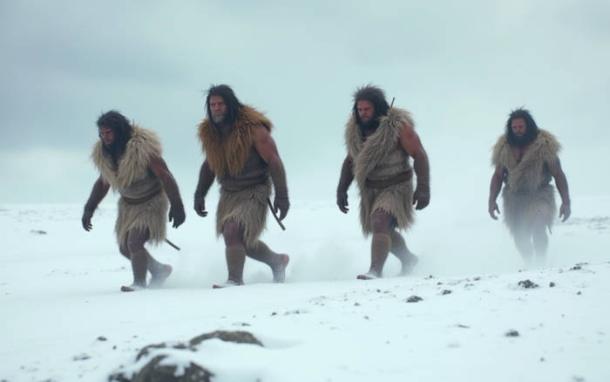Top Stories
Archaeologists Confirm Early Humans Survived Ice Age 440,000 Years Ago

BREAKING: A groundbreaking archaeological discovery in Canterbury has just confirmed that early humans, specifically Homo heidelbergensis, remarkably survived one of the most extreme ice ages in northern Europe, the Anglian glaciation, around 440,000 years ago. This revelation is set to reshape our understanding of human resilience during prehistoric times.
Excavations at Old Park, Canterbury, have uncovered compelling evidence that these early humans not only inhabited the region over 700,000 years ago but also adapted to endure brutal conditions during the ice age. This research, published in the prestigious journal Nature Ecology and Evolution by a team from the University of Cambridge, provides the first concrete proof of early human adaptability in such harsh climates.
This discovery challenges long-standing beliefs about human survival in prehistoric Europe. Prior assumptions suggested that early humans struggled to cope with extreme environmental changes. However, this latest evidence showcases their remarkable ability to endure and thrive, even in the face of relentless ice and cold.
The implications of this finding are vast, as it highlights the resilience of our ancestors and provides new insights into human evolution. Understanding how Homo heidelbergensis managed to survive during this harsh period could lead to a reevaluation of human adaptability across various climates and conditions.
Authorities are emphasizing the importance of this discovery for both archaeology and anthropology. The evidence from Canterbury signifies a pivotal moment in our understanding of human history and the evolutionary journey that shaped modern humans.
As researchers continue to analyze artifacts and further investigate the site, experts urge the public to stay tuned for more updates on this extraordinary find. This breakthrough not only enriches our knowledge of early human life but also serves as a gripping reminder of the enduring spirit of survival against all odds.
This urgent discovery is expected to spark significant interest in the field of human origins and evolution, making it a hot topic for discussion among scientists and the general public alike. Share this article to spread the word about this incredible milestone in our understanding of early humans!
-

 Top Stories2 months ago
Top Stories2 months agoTributes Surge for 9-Year-Old Leon Briody After Cancer Battle
-

 Entertainment3 months ago
Entertainment3 months agoAimee Osbourne Joins Family for Emotional Tribute to Ozzy
-

 Politics3 months ago
Politics3 months agoDanny Healy-Rae Considers Complaint After Altercation with Garda
-

 Top Stories3 months ago
Top Stories3 months agoIreland Enjoys Summer Heat as Hurricane Erin Approaches Atlantic
-

 World4 months ago
World4 months agoHawaii Commemorates 80 Years Since Hiroshima Bombing with Ceremony
-

 Top Stories2 months ago
Top Stories2 months agoNewcastle West Woman Patricia Foley Found Safe After Urgent Search
-

 Top Stories4 months ago
Top Stories4 months agoFianna Fáil TDs Urgently Consider Maire Geoghegan-Quinn for Presidency
-

 World4 months ago
World4 months agoGaza Aid Distribution Tragedy: 20 Killed Amid Ongoing Violence
-

 World4 months ago
World4 months agoCouple Convicted of Murdering Two-Year-Old Grandson in Wales
-

 Top Stories3 months ago
Top Stories3 months agoClimbing Errigal: A Must-Do Summer Adventure in Donegal
-

 World4 months ago
World4 months agoAristocrat Constance Marten and Partner Convicted of Infant Murder
-

 Top Stories3 months ago
Top Stories3 months agoHike Donegal’s Errigal Mountain NOW for Unforgettable Summer Views









